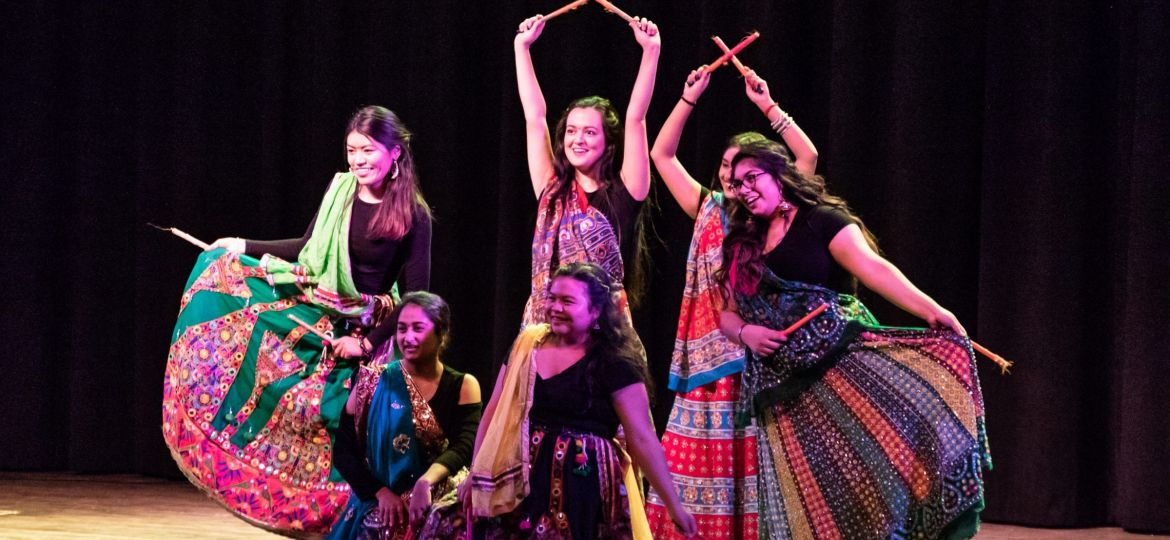
Celebrate South Asia! (CSA!) presented “Omkara: Reclaiming Identity” in the Lion’s Pause on Saturday, Nov. 3. Omkara is a cultural event meant to share the diverse South Asian cultures, foods and traditions with the St. Olaf community. The event was dazzling, emotional and educational through its powerful celebration of identity.
“We hope to create a space here and now in which we can be fully free to share and express ourselves – every aspect of ourselves,” CSA! Co-Chair Esha Syal ’20 announced at the beginning of the event.
The Lion’s Pause was transformed for the event – long tables filled the Pause while tapestries and twinkle lights hung from the walls, creating an intimate, if not overcrowded, atmosphere. But, the audience didn’t seem to mind having their chairs overlap with one another or having to crane their necks to see the action onstage as long as they could take part in such a vibrant celebration.
A standout performance was “Kshitij’s Song,” where Kshitij Gurang ’20 serenaded the audience with easy confidence. The song, which translates in part to “My wife, don’t cry. I will come back and we will spend our old age happily,” tells the story of the thousands of Nepali youth who travel to other countries to find work. Oftentimes, these workers die in harsh labor conditions, and are never able to return to their loved ones. Gurang did the song justice with his colorful, emotive voice.
While Omkara had moments of seriousness and reflection, such as “Kshitij’s Song,” the event also included performances which conveyed complete exhilaration. On stage, the performers glittered with their colorful outfits and beaming faces during female anthems like “Garba” and Bollywood-inspired dances like “Bollywood through the Ages” and “Bollywood Fusion.”
One of the emcees announced that Omkara is a showcase of South Indian culture “that is rarely seen in Bollywood.” With strobe lights, disco balls, whips and nae naes, I can imagine that being true. During these group dances especially, the audience was cheering and clapping along.
One of the most powerful performances, one that silenced the generally animated audience, was the group poetry reading of “What They Took with Them.” The poem, by Jenifer Toksvig, tells the true accounts of 21st century refugees as they fled their homes. Standing in a row on the Pause Mane Stage, the student readers listed the “things” left behind, the symbols of home lost in the hurry of forced migration.
“The most painful thing about being a refugee is that one day you wake up and you’ve lost your liberty,” one student read.
“Stories like this are very similar to many of your guys’ stories,” Atefeh Alavi ’20, one of Omkara’s emcees, said, speaking to the shared stories and experiences of the performers. “I’m really proud of the people who have gone through pain and challenges,” she said.
The name “Omkara” stems from the sanskrit word, “Om,” which is a primordial sound from which the universe was created. The second part of the event’s title, “Reclaiming Identity,” speaks to the self expression of the students involved in Omkara, claiming their cultural identities through dance, songs, skits and the spoken word.
CSA! Co-Chair Amrita Bhagia ’19 defined the act of reclaiming identity as “a way to break down and dismantle the false connotations that are associated with us as individuals within a larger society or culture.” She added, “Today, we claim this space as our space – a space of empowement, of freedom and of self-identity.”
All proceeds from Omkara will go to BRAC, a nonprofit organization based in Bangladesh that helps Rohingya Refugees with their short-term needs such as water, shelter, healthcare and education.







